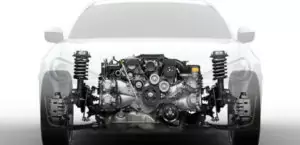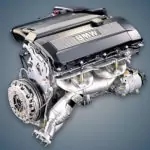The M42B18 engine is an inline 4-cylinder engine developed from the M40B18. It differs from its predecessor mainly in the new, more efficient aluminum 16-valve cylinder head with two camshafts and an optimized combustion chamber.
As before, hydraulic valve clearance compensators are used on the M42. The diameter of the intake valves is 33 mm, exhaust 30.5 mm. Characteristics of standard M42 camshafts: phase 240, rise 9.7.
In addition, the crankshaft is different, the pistons and connecting rods (140 mm), the intake and exhaust manifolds, the two-stage throttle valve are lightened, the timing belt drive is replaced with a more reliable chain drive.
Specifications
| Production years | 1989-1996 |
| Displacement, cc | 1796 |
| Fuel system | injector |
| Power output, hp | 140 /6000 rpm |
| Torque output, Nm | 175 /4500 rpm |
| Cylinder block | cast iron R4 |
| Block head | aluminum 16v |
| Cylinder bore, mm | 84 |
| Piston stroke, mm | 81 |
| Compression ratio | 10.0 |
| Features | no |
| Hydraulic lifters | yes |
| Timing drive | chain |
| Turbocharging | no |
| Recommended engine oil | 0W-30 / 0W-40 / 5W-30 / 5W-40 / 10W-40 |
| Engine oil capacity, liter | 5.0 |
| Fuel type | petrol |
| Euro standards | EURO 2 |
| Fuel consumption, L/100 km (for 318is E36) — city — highway — combined |
10.9 6.4 7.7 |
| Engine lifespan, km | ~300 000 |
Disadvantages of the M42B18 engine
Among the problems typical for the M42B18: unstable rpm, knocking, jolts during acceleration, overheating.

- A knock in the power unit appears due to wear on the camshaft, hydraulic lifters and rocker arms. Verification required.
- If the revolutions are unstable, the reason may be hidden in the violation of the integrity of the duct, air leaks are possible. They also inspect the lambda probe, mass air flow sensor, idle valve and the throttle valve. If the camshaft is difficult to rotate, this causes a floating speed problem.
- The engine begins to overheat when the pump, radiator, thermostat breaks down. Air pockets in the cooling system may be the cause. You also need to check the integrity of the plastic pipes in the cooling system.
- When the engine jerks during acceleration, it is most likely that the injectors need to be cleaned. If the engine does not start, check the spark plugs, the fuel pump, the ignition coil, and high-voltage wires.






